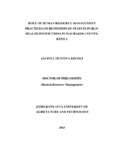ROLE OF HUMAN RESOURCE MANAGEMENT PRACTICES ON RETENTION OF STAFF IN PUBLIC HEALTH INSTITUTIONS IN MACHAKOS COUNTY, KENYA
Abstract
The purpose of this study was to explore the role of HRM practices on the retention of staff in public health institutions in Machakos County. The objectives of the study were to explore therole of remuneration practices, to analyze the role of training and development practices, to explore the role of career advancement practices and to analyze the role of work-life balance practices on the retention of staff in public health institutions in Machakos County. Four hypotheses were developed in line with the research objectives. The study adopted a mixed methods research design and targeted all the 772 health care staff in the 152 public health facilities in the eight sub-counties in the county. The population was stratified into 8 main strata consisting of doctors, dentists, clinical officers, nurses, physiotherapists, pharmacists, laboratory technicians and radiographers. The hospitals were selected purposively while stratified random sampling was used to select the health care and dispensaries from each of the sub-counties. Stratified random and purposive sampling were used to select a total of 263 respondents from the various strata identified. Interviews were used to collect data from 12 officers in charge of sub county facilities and the four hospitals while self-administered questionnaires were used on the rest of the respondents. With the help of the statistical package for social sciences (SPSS) programme version 18 regression analysis was done and the results used to test the hypotheses, determine the coefficients of the multiple regression model to establish the sample regression model and to evaluate the reliability of the estimated relationship. Through content analysis qualitative data collected was analyzed in line with the major themes. The data was then presented using frequency tables, bar graphs and pie charts. Positive responses were received from 227 respondents out of the sampled 251 giving a 90% response rate. The findings were that there were weak but statistically significant positive relationships between remuneration practices, career advancement practices, work environment management practices and work-life balance practices and retention. The reward practices, career advancement practices,
xviiiwork environment management practices and work-life balance practices in place were found to be unsatisfactory. For instances, salaries were poor and often delayed and critical allowances were not provided, promotions were notdone appropriately, there facilities were not properly equipped and a number were in poor physical state while flexi working programmes were not provided. Due to the poor remuneration, career advancement, work environment and work-life balance practices, the employees‘ level of commitment was low. However their intent to leave was also low because finding alternative jobs was difficult among other reasons. Other HRM practices such as leadership, employee involvement, performance management were also said to influence retention in the health care facilities. Based on these findings, it was recommended that Machakos county government should look into the aspects of remuneration, career advancement, work environment and working life balance practices and put in place mechanisms that would address these practices and thus minimize their negative effects on staff satisfaction and commitment hence retention in the health care institutions in the county
Collections
- MKSU Doctoral Theses [51]

